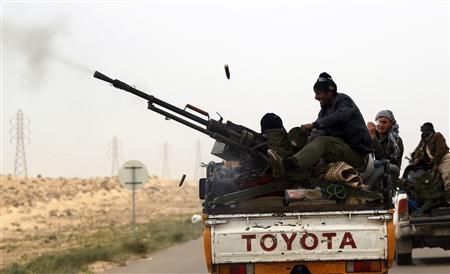
Wars too often are created by illusions and delusions. This is what is happening in Libya.
It is an illusion to believe that if Libyan leader Moammar Gadhafi clings to power, the credibility and authority of the United Nations, Arab League, NATO, United States and other states comprising the opposing coalition won’t be dealt a severe blow with accruing consequences.
But, it is a delusion to think that if the rebels don’t succeed in ridding Libya of this desert rat, there is no possibility of an outside ground assault to finish job.
The excruciating dilemma is that to limit the damage caused by the first illusion of Gadhafi holding on, reversing the delusion that no alternative exists leads to a course of action likely to prove unacceptable. Either way, the news is very bad.
As a result, we could be stuck in Libya and in a larger sense with an Arab Spring that could metastasize into an Arab winter of discontent.
We have agonized over what to do about Libya. The Arab League surprisingly sought a no-fly zone over Libya to protect civilians. Despite five abstentions, the United Nations followed suit with U.N. Security Council Resolution 1973 authorizing “all necessary means” short of occupation to protect innocent civilians.
Then NATO, in its own lurching way, pressured by the United States and United Kingdom, agreed to assume command of all military operations that include sustaining a no-fly zone, airstrikes to protect (and aid) the rebels and an arms embargo.
The demand that Gadhafi must go leads to an inescapable conclusion. Like it or not — and very few will like it — ground forces may be necessary to remove Gadhafi if he doesn’t leave by other means or if the rebels fail to dislodge him. Stalemate is to Gadhafi’s advantage.
At this point, the use of outside ground forces is thinking about the unthinkable. Who would have the capacity and the stomach to supply the forces?
Beyond that very tricky matter, no one has any idea of what a replacement government would look like, how that transition could be made and for how long outside countries are prepared to invest time and money to ensure stability in that oil rich land.
And, perhaps we unsuspectingly delude ourselves by calling the rebels “democratic forces.”
U.S. President Barack Obama tried to square these circles in his address Monday night. Sadly, the president had no running room. He didn’t wish to antagonize Arabs and Muslims further by calling for a third U.S. intervention into those worlds.
For the moment, explicit recognition of the need to use force to expel or remove Gadhafi is something the administration will defer like the plague until it sees whether the rebel forces are capable of achieving that end state with minimal outside help.
The tragedy is that we and the coalition face a potential quagmire. And the options are not favorable.
First, the rebels could succeed in throwing Gadhafi out one way or another. Providing arms and air attacks could be part of this option best conducted with Arab or Muslim help from outside Libya. For a betting person, this is a “Hail Mary” option.
Second, a standoff or partition of Libya with Gadhafi in control in the west and the rebels in the east could follow.
Tightening Obama’s noose, Gadhafi would face a strategy of attrition and death by a thousand cuts. Significantly, he would still be in power and this could last for an extended period. This option makes hollow our threats and credibility and makes Gadhafi at least the de facto winner.
Finally, there is a Noriega option. In December 1989, U.S. President George H.W. Bush sent U.S. forces into Panama to capture President Manuel Noriega. A similar operation could be mounted to end Gadhafi’s rule.
The risks are breathtaking. The prospect of bloody battles and massive casualties cannot be excluded. Reprisals against such an attack from terror groups would be likely.
A political backlash, and not merely from the Arab world, as Security Council Resolution 1973 precludes occupation would be severe. And finding the forces and willing partners to intervene may be Missions: Impossible.
Here, illusion collides with delusion. Whether the United Nations, Arab League and other organizations realized it or not, a no-fly zone would ultimately lead to this juncture. To succeed, Gadhafi must go. If the rebels are unable to achieve that goal, someone else must. This is the inevitable consequence of the decision to impose a no-fly zone and the illusion it would work.
Perhaps the leaking of such plans will force Gadhafi to quit. But don’t count on it. Then, if all else fails, the illusion will leave a single unpalatable and risk-laden alternative — direct intervention on the ground — what some will call the ultimate delusion.
Harlan Ullman is Senior Advisor at the Atlantic Council, Chairman of the Killowen Group that advises leaders of government and business, and a frequent advisor to NATO. This article was syndicated by UPI.
Image: reuters%203%2017%2011%20Libyan%20rebels.jpg
